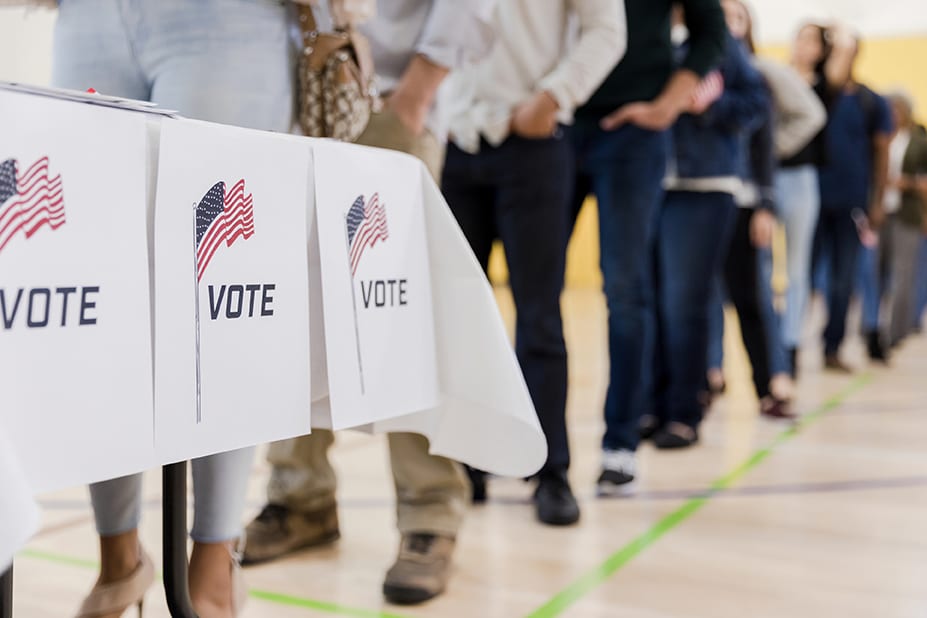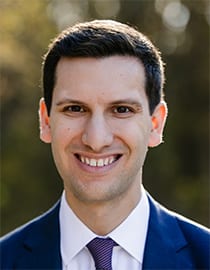
By Andrew Cohen
Eyeing an uncertain landscape with the presidential election result still in doubt, six Berkeley Law professors and Dean Erwin Chemerinsky provided a roadmap Wednesday for what may come next in several legal areas.

During a livestreamed Berkeley Law Conversations event available here, Chemerinsky said “there are many reasons to believe this could stretch out for some time.” He noted the potential for recounts, how President Donald Trump’s legal team is pursuing litigation in multiple states, and that in 2000 the election was not decided until December 12, when the Supreme Court ruled on Bush v. Gore.
Chemerinsky reminded attendees that while even before the election President Trump mentioned having the Supreme Court intervene to decide the outcome, “he would have to start in lower courts — he doesn’t get to go right to the Supreme Court.”
Assessing the tight vote in Pennsylvania, Chemerinsky discussed how a state statute that mail-in ballots must be received by Nov. 3 to be counted could come into play. Due to the pandemic and the U.S. Postal Service slowdown, the Pennsylvania Supreme Court ruled that ballots would be counted if they arrive by Nov. 6. Trump is seeking to invalidate that order.
“Imagine if after counting the ballots that arrived by Nov. 3, President Trump was ahead, but then adding the ballots that arrived between Nov. 3 and Nov. 6, Joe Biden was ahead,” Chemerinsky said. “If Pennsylvania is the deciding state, could it be a 5-4 vote with Amy Coney Barrett joining the conservative majority? Trump has explicitly said he wanted his nominee on the court to decide the election.”
Overall, Chemerinsky said “the good news is that more people voted than ever, and that the election occurred peacefully,” while on the flip side “the election shows a country that is so deeply divided about everything … How do we bring this country together?”
Voter suppression

Professor and election law expert Bertrall Ross described how such a close and contentious election will only fuel efforts to subvert voting.
“Something Trump accelerated that Republicans have been doing the past couple decades is engaging in voter suppression tactics,” he said, citing voter ID laws, misinformation campaigns, and shifting polling places “to render an important section of the Voting Rights Act moot.”
He expressed concern that in seeing Democrats’ advantage in early voting, Republicans will work to limit such voting methods in future elections.
Given the apparent likelihood of a Republican-controlled Senate, Ross noted that concerns of court-packing are now less pronounced even if Biden wins, as judicial vacancies will be harder to fill. As for how aggressive Biden may be in using executive power to advance his policies, Ross said, “My worry is that it could further distort separation of powers and our checks and balances system.‘’
Government gridlock

Anticipating heated battles between a Biden administration and a Republican Senate, Professor Jonathan S. Gould anticipates “gridlock similar to the end of the Obama years.” He said the country could face government shutdowns, major wrangling over the debt ceiling, and challenges to filling judicial and executive branch vacancies that require Senate confirmation.
Gould did emphasize that “we can’t understate how important it is to control executive branch appointees,” and that Biden will be able to advance his agenda this way. “The more ominous story on administrative power,” Gould said, is the tide of “anti-administrativism” on the right wing of the courts, “a deep skepticism of administrative power.”
Courts have traditionally deferred to federal agencies when they interpret ambiguous statutes, he explained. But there has been a groundswell of conservative opposition to this approach led by U.S. Supreme Court Justice Neil Gorsuch.
If the Republicans control the Senate as expected, Gould said potential reforms would be stalled on issues like abolishing the Electoral College — which gives a large Senate edge to the small, rural states that traditionally vote Republican — and making changes to the Supreme Court, which now has a majority of justices appointed by presidents who lost the popular vote.
Health care’s future

Professor Khiara M. Bridges discussed the future of the Affordable Care Act (ACA) and the upcoming Supreme Court argument about the legitimacy of its individual mandate, which initially required paying a penalty to the IRS if a minimum level of health insurance is not met.
The court narrowly upheld the mandate and the law in 2012, and a Republican-led Congress eliminated the fines associated with the mandate in 2017. Now, 18 states and the Trump administration are arguing that the individual mandate is unconstitutional without the fines and that the entire act is unconstitutional as a result.
Given the Supreme Court’s composition, Bridges believes the court will not allow the ACA to continue as is, that its scope may be reduced — if not struck down entirely — and that more people will be without access to basic health care.
“The Affordable Care Act does leave much to be desired,” Bridges said. “We should hope to ensure that everyone has access to health care. In 2018, there were still 27.9 million non-elderly people who were uninsured … Most were low-income, in families with at least one worker, and people of color were disproportionately represented. We should hope for more than saving the ACA. We should hope to pass a law giving everyone access to health care. The fact that they don’t is an economic injustice and a racial injustice.”
Environmental landscape

Professor Daniel Farber, faculty director for Berkeley Law’s Center for Law, Energy & the Environment, said attempted environmental rollbacks will continue if Trump is reelected and that oil and gas production will be maintained. But he also asserted that “Trump is fighting against a rising tide in the face of strong pressures to address climate change in getting to a more sustainable future that he’d be trying to push against.”
The drop in renewable energy prices, Farber said, means “coal use will go down — the industry simply isn’t economically viable right now.” He added that if Biden wins and Republicans control the Senate, “on day one he’ll rejoin the Paris Agreement” and that while overall “it won’t be what Democrats and climate advocates had hoped for, I think there will be definite progress.”
“Progressives will find themselves in the unaccustomed position of applauding states’ rights as they’re not going to get much from the federal government,” Farber said. “A Biden win does unlock the considerable power of the presidency to stop rollbacks, push forward new regulations, and you might get some funding help from Congress.”
Criminal justice

While police practices, incarceration rates, and the bail system are hot-button political topics, Professor Andrea Roth explained that states largely control criminal prosecutions. She noted that 88 percent of those incarcerated are sentenced under state laws, and that there are formidable limits to how the president, Senate, and Congress can affect criminal justice.
Still, she said the presidency plays a key role in influencing the culture, rhetoric, and agenda-setting surrounding criminal justice issues. Roth explored the state and local elections of numerous progressive prosecutors, and the implications of South Dakota (a conservative state) decriminalizing marjiuana and Oregon decriminalizing all drug possession.
“Expect to see little investigation of police department practices” no matter who prevails, Roth said. “If Biden wins, we will see federal funding tied to changes in local police departments for certain policy changes like getting rid of choke holds … and we’ll see incentives given to states to eliminate things like fines and fees.”
Immigration concerns

Professor Leti Volpp, who directs the campus-wide Center for Race and Gender, probed a stark contrast in immigration policy between the candidates. She said Trump has dramatically transformed the federal immigration system with more than 400 policy chances done almost entirely through executive fiat.
Between 2016 and 2019, Volpp said immigration fell about 50 percent, to around 600,000 per year, a level not seen since the 1980s. The president sets a cap on how many overseas refugees can be admitted each year, and Barack Obama set the cap at 125,000 during his last year — a stark contrast from the 15,000 cap Trump set this fiscal year.
“They ended brands of protected status for many people who have lived here for decades and now face deportation,” Volpp said. If Trump is reelected, she expects him to try to amend the current agreement that says children cannot be held for more than 20 days in ICE detention, and to crack down on sanctuary cities.
While Biden has argued that immigrants and immigrant communities are not a threat to U.S. national security, Volpp noted that he would pursue enforcement against those who threaten U.S. security. She also expects Biden would “stop the border wall, double the number of immigration judges, stop workplace raids, and improve the naturalization process.”